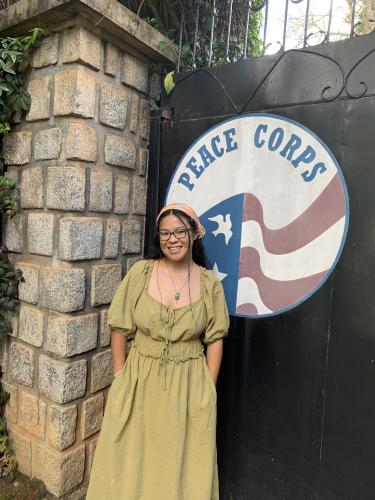Buffs continue to serve—Ranked No. 2 nationally for Peace Corps volunteers
Vaccine distribution walk in Madgascar. Photo courtesy of Julia Leone.
CU Boulder is ranked No. 2 in the nation for graduates serving as Peace Corps volunteers, with 39 alumni currently serving around the world, according to the recently released Peace Corps 2025 Top Volunteer-Producing Colleges and Universities list.
Forever Buffs are currently serving in 28 countries around the world, including Albania/Montenegro (one post), Belize, Cambodia, Colombia, Eastern Caribbean (one post), Ecuador, Eswatini, Fiji, Georgia, Guinea, Guyana, Indonesia, Kenya, Lesotho, Madagascar, Morocco, Namibia, North Macedonia, Panama, Paraguay, Philippines, Senegal, South Africa, Tanzania, Thailand, Togo, Uganda and Zambia.
"This top ranking recognizes that CU Boulder students are passionate about making a difference, growing their perspectives and transforming lives,” said Internship Coordinator Eva Schwartz, who oversees the Peace Corps recruiting office on campus.
"Peace Corps allows our alumni to create a lasting impact by taking their knowledge and skills globally to build relationships, culture and global impact. We are proud that so many Buffs are making a difference in communities worldwide.”
CU Boulder has a long history of turning out civically engaged graduates, having ranked No. 1 for Peace Corps volunteers twice—in 2011 and 2012—and No. 5 all time, with 2,298 volunteers since the Peace Corps’ founding in 1961.
Peace Corps Prep
CU Boulder is one of 143 schools across the country that offers Peace Corps Prep, a partnership program dedicated to preparing undergraduates for service abroad.
Housed within the CU Boulder Center for Leadership, the undergraduate certificate program offers future U.S. Peace Corps volunteer applicants sector-specific job skills, foreign language proficiency, intercultural competence and professional leadership development skills. As an official Peace Corps Prep program, earning the certificate is excellent preparation, and a likely advantage, for future Peace Corps volunteer applicants.
Launched in fall 2018, the program is open to all CU Boulder undergraduates, regardless of their major, minor, department, academic year or participation in other programs.
By the numbers
2025 Top Large Colleges and Universities
1. University of Wisconsin-Madison (46)
2. University of Colorado Boulder (39)
3. University of Florida (34)
4. University of Maryland, College Park (28)
4. University of Virginia (28)
4. Virginia Tech (28)
*More than 15,000 undergraduates
Historical, Since 1961
1. University of California, Berkeley (3,163)
2. University of Wisconsin-Madison (3,074)
3. University of Washington (2,700)
4. University of Michigan (2,528)
5. University of Colorado Boulder (2,298)
*All rankings are calculated based on fiscal year 2024 data as of September 30, 2024, as self-reported by Peace Corps volunteers.
Volunteer spotlight: CU alumna Julia Leone
CU Boulder alumna Julia Leone spent two years with the Peace Corps in Madagascar as a health volunteer.

What was your biggest surprise when it came to your service?
This is a tricky question. I think I was shocked by how quickly my life in Madagascar started to feel so normal. When you first arrive, everything is so overwhelming you start to panic a little about whether or not you'll ever find your footing. But, comfort and routine come surprisingly fast.
What tools did you gain from your time at CU Boulder that helped you in your service?
I graduated from CU in 2022 after double majoring in Jewish studies and international affairs. For me, my CU experience was largely marked by community, mentorship and learning how to navigate difficult and unexpected obstacles. Being able to come up with creative and collaborative solutions to big and small problems, especially across cultural and language divides, is vital to Peace Corps service.
What was your main takeaway from your experience serving?
There's a lot I could say about the lessons learned from Peace Corps service, but the main takeaway was being confronted with how wasteful I had been in the U.S. and how damaging overconsumption and immediate gratification culture is in the U.S.
What advice would you give to a student thinking about serving?
Two years sounds like a long time, and it is, but two years will pass no matter what you do, so you might as well go do something that scares you and pushes you. Making connections, learning about a culture different from yours, helping where you can and when you can is a worthwhile effort more important now than ever.
What was your favorite part about going to CU Boulder?
Boulder is beautiful, that's an easy one. But on a deeper level, my involvement in the Program in Jewish Studies at Boulder was invaluable. The program is tight-knit, with the most supportive and engaging professors. I had classes as small as three people. At a school as big as CU, I really appreciated finding a “home.”
Where are you now?
I just completed my service a few months ago, so I'm still finding my footing (reverse culture shock is real, and almost more difficult to deal with than culture shock). I'm currently working for the Jewish Language Project in their development and communications sector, helping to strengthen their messaging and preserve the diverse sociocultural and linguistic history of Jewish languages.
Getting involved at CU Boulder
CU Boulder has a part-time Peace Corps strategic campus recruiter during the academic year. Stop by UMC, Room 122, on Tuesdays and Thursdays, 11 a.m.–2 p.m. during the school year to learn more, or reach out atpeacecorps@colorado.edu.
About the Peace Corps
President John F. Kennedy established the Peace Corps in 1961, and more than 240,000 Americans have served in 144 countries worldwide. Peace Corps volunteers work alongside community members across the globe on projects in the areas of education, health, environment, agriculture, community economic development and youth development.


